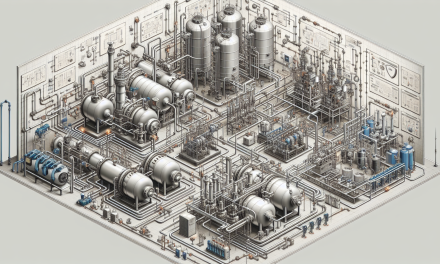Table of Contents
- Introduction
- Core Skills for Oil and Gas Professionals
- Leadership Abilities
- Technical Knowledge
- Financial Management
- Risk Management
- Regulatory Compliance
- Effective Communication
- Team Building and Collaboration
- Conclusion
- FAQs
Introduction
The oil and gas industry plays a critical role in the global economy, providing energy and fuel for various sectors. Successfully managing operations in this dynamic field requires a diverse skill set. Individuals in management positions must possess not only strong technical expertise but also an understanding of economics, leadership, and compliance. This blend of skills is vital for navigating the complexities of the industry and leading teams to success.
Core Skills for Oil and Gas Professionals
Let’s explore the essential skills that oil and gas professionals must develop to thrive in their careers. These skills not only enhance individual performance but also contribute significantly to the overall success of organizations in the energy sector.
Leadership Abilities
First and foremost, effective leadership is essential in the oil and gas industry. Leaders guide teams through challenges, inspire confidence, and drive productivity. Developing leadership skills involves several key components:
- Visionary Thinking: Great leaders have a clear vision for the future. They understand industry trends and can anticipate challenges.
- Decision-Making: Making informed decisions quickly can save companies time and significant resources. Leaders must analyze data, weigh risks, and choose the best course of action.
- Emotional Intelligence: Understanding and managing one’s emotions, and those of team members, enhances communication and conflict resolution.
Consequently, strong leaders emerge as pivotal figures in driving company culture and ensuring a productive work environment.
Technical Knowledge
In addition to leadership skills, a deep technical understanding of oil and gas operations is crucial. Professionals should stay updated with the latest technologies and methodologies. For instance, advancements in centrifugal pump and valve technology significantly impact operational efficiency. Moreover, mastering compressor and pump technology control is vital for optimal performance.
Being knowledgeable about these systems allows professionals to manage teams effectively and innovate processes to enhance productivity. Additionally, familiarity with advanced compressor technology innovations can lead to improved performance and reduced costs.
Financial Management
Financial acumen is another vital skill for professionals in the oil and gas sector. Understanding how to manage budgets, forecast expenses, and analyze profit margins helps maintain efficient operations. Professionals need to consider the following:
- Budget Preparation: Developing precise budgets is essential for any project. Professionals should be adept at aligning budgets with strategic goals.
- Cost Control: Monitoring expenditures prevents overruns. Implementing cost-saving strategies while maintaining quality is imperative.
- Financial Reporting: Regularly reviewing financial statements allows management to make informed decisions based on current financial health.
Mastering financial management elevates a professional’s ability to contribute effectively to organizational strategies.
Risk Management
Promptly identifying and mitigating risks can safeguard projects and protect resources. Professionals must develop risk management techniques, including:
- Risk Assessment: Identify potential risks at the outset of any project.
- Mitigation Strategies: Develop strategies to lessen the impact of risks.
- Contingency Planning: Create fallback plans to address unforeseen circumstances.
By prioritizing risk management, organizations can navigate uncertainties with confidence.
Regulatory Compliance
The oil and gas industry is heavily regulated. Consequently, professionals must keep abreast of current laws and regulations. Awareness of compliance standards is essential for maintaining operational integrity. A few focused areas include:
- Environmental Regulations: Professionals must ensure compliance with environmental laws to minimize ecological impacts.
- Safety Standards: Understanding and adhering to safety regulations protects employees and reduces liability.
- Industry Standards: Keeping up with industry best practices allows organizations to operate effectively and gain a competitive edge.
Adherence to regulations not only safeguards operations but also enhances a company’s reputation.
Effective Communication
Effective communication is paramount in the oil and gas industry. Clear communication fosters collaboration, reduces misunderstandings, and builds a robust team dynamic. Here are important points to consider:
- Active Listening: Listening attentively to team members promotes an inclusive atmosphere.
- Clarity and Conciseness: Expressing ideas simply and directly aids in information retention.
- Feedback Mechanisms: Establishing regular feedback loops enhances performance by allowing for continuous improvement.
As a result, effective communicators can lead teams toward achieving organizational goals more efficiently.
Team Building and Collaboration
Building a strong team is essential for attaining goals in the oil and gas sector. A high-performance team combines diverse skills and perspectives, leading to better outcomes. Key elements of team building include:
- Creating a Positive Work Environment: Encouraging open dialogue and fostering respect among team members enhances job satisfaction.
- Conflict Resolution: Addressing conflicts promptly and effectively maintains harmony in the workplace.
- Encouraging Collaboration: Team-building activities can enhance camaraderie, thus improving collaboration.
Ultimately, a cohesive team works more efficiently, contributing positively to the organization’s overall goals.
Conclusion
In summary, mastering the essential skills of leadership, technical knowledge, financial management, risk management, regulatory compliance, effective communication, and team building equips oil and gas professionals for success. The complexity of the industry demands individuals who can navigate challenges skillfully, enabling their organizations to thrive in a competitive environment. Moreover, professionals interested in enhancing their capabilities can benefit from resources such as the Essential Oil & Gas Management Skills Course for Professionals, which offers valuable insights into these critical areas.
FAQs
What are the key skills needed for oil and gas management?
The key skills include leadership abilities, technical knowledge, financial management, risk management, regulatory compliance, effective communication, and team building.
How can I improve my skills in the oil and gas industry?
Engaging in training programs, seeking mentorship, and remaining updated on industry trends can significantly enhance your skills.
Why is risk management important in the oil and gas sector?
Risk management is crucial as it helps identify, assess, and mitigate potential risks, thereby safeguarding projects and resources.
What role does effective communication play in oil and gas management?
Effective communication facilitates collaboration, clarifies expectations, and reduces misunderstandings, which all contribute to a successful team dynamic.
Can you recommend resources for further knowledge?
Yes, consider exploring the following articles for insights: Hydrocarbon production and career transformation insights.





